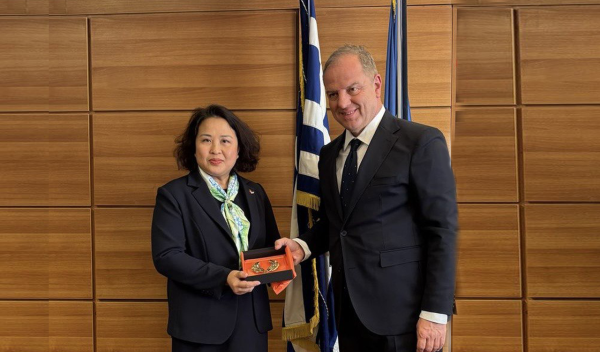
Atop member of an association representing short-term rental companies in Greece forecasts revenues for the state this year from the sector to exceed one billion euros, speaking on a podcast this week.
At the same time, Theoharis Michailidis, a founding member and general secretary of the Association of Short-Term Rental Companies, warned the government against imposing a ceiling on the number of days, per year, that owner can lease out their own property for short-term rentals – usually via the well-known online platforms, namely, AirBnB. He warned that such intervention by the state on private property use would mere “push many towards illegal activities”.
He also criticized a new annual property tax of 600 euros, imposed without sufficient consultation as he charged, contrasting it with previous discussions on VAT rates.
Short-term rentals have sparked debate within Greek society due to their perceived benefits and disadvantages. Government plans to revisit regulations stem from concerns over rising rents in the urban areas and the impact on neighborhoods.
Looking ahead, Michailidis projected that the state stands to earn at least one billion euros from short-term rentals in 2024, primarily through VAT.
He highlighted Greece’s surplus of housing , particularly in greater Athens, while underscoring the need to renovate these properties and address legal complexities involving owners who are state entities or non-profit institutions.
He also emphasizes Greece’s high rate of property ownership among individuals, stressing that these properties support livelihoods by funding education, mortgages, pensions, and contributing to the economy, rather than being managed by income-generating funds.
Managing short-term rentals has become increasingly complex economically and tax-wise, with stringent obligations including monthly declarations and payments for climate levies and VAT.
Regarding Athens’ historic center, Michailidis noted that Airbnb’s presence revitalized the area without displacing residents, focusing on repurposed industrial and craft buildings. The transformation has fostered a vibrant community of shops, restaurants, and rooftop bars, leveraging its prime location overlooking the Acropolis.
In light of affordability challenges, he highlighted nearby areas, offering more cost-effective accommodations within a 15-minute radius.
Airbnb in Greece has exploded over the past 10 years with many property owners initially using it as a model for supplementary revenue. Gradually short-term rentals, especially in urban centers grew, becoming a vibrant real estate industry that forced the Greek state to make legislative interventions.
Source: tovima.com
Latest News

Servicers: How More Properties Could Enter the Greek Market
Buying or renting a home is out of reach for many in Greece. Servicers propose faster processes and incentives to boost property supply and ease the housing crisis.

Greek Easter 2025: Price Hikes on Lamb, Eggs & Sweets
According to the Greek Consumers’ Institute, hosting an Easter dinner for eight now costs approximately €361.95 — an increase of €11 compared to 2024.

FM Gerapetritis Calls for Unified EU Response to Global Crises at EU Council
"Europe is navigating through unprecedented crises — wars, humanitarian disasters, climate emergencies," he stated.

Holy Week Store Hours in Greece
Retail stores across Greece are now operating on extended holiday hours for Holy Week, following their Sunday opening on April 13. The move aims to accommodate consumers ahead of Easter, but merchants remain cautious amid sluggish market activity.

Green Getaway Ideas for Easter 2025 in Greece
Celebrate Easter 2025 in Greece the sustainable way with eco-farms, car-free islands, and family-friendly getaways rooted in nature and tradition.

Civil Protection Minister Details Summer Firefighting Plans at Delphi Forum
At the 10th Delphi Economic Forum, Minister of Climate Crisis and Civil Protection Yiannis Kefalogiannis discussed Greece's plans for the upcoming fire season.

How Shops and Markets Will Operate During Easter Holy Week
The Easter holiday schedule has been in effect since April 10, with retail stores open Palm Sunday, and most supermarkets also operating to meet consumer demand for Easter shopping

Why Is the French Aircraft Carrier Charles De Gaulle in Piraeus?
Docking in Piraeus after a four-month deployment in the Indo-Pacific region, the admiral of the aircraft carrier the Charles de Gaulle says, "Greece is our best partner in the Mediterranean."

Riots and Vandalism in Downtown Athens Exarcheia Region
Night of unrest in downtown Athens' region of Exarcheia – 11 Cars Burned, 72 Detentions

Truth Team: Is the PM and his team telling the truth, the whole truth and nothing but the truth?
The Greek government spokesman noted that "a private individual received payment from other private individuals, and for some people this is a horrifying revelation."







































 Αριθμός Πιστοποίησης
Αριθμός Πιστοποίησης